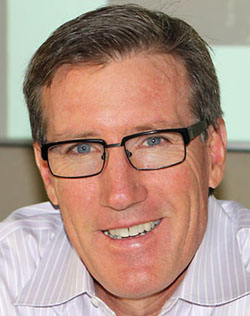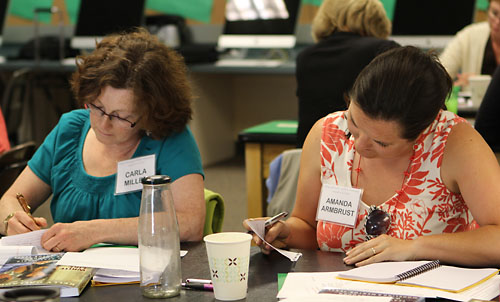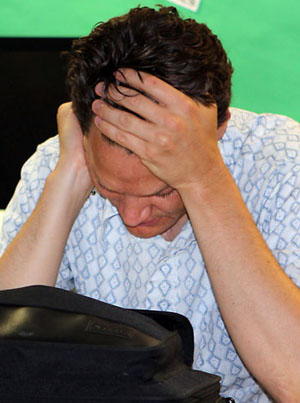| |
 Writing coach Kelly Gallagher, a teacher and author from Anaheim, California.
Learning to Teach to Write
Three days with Kelly Gallagher
story and photos by Solveig Torvik
Outside, it’s one of those lovely summer days that everyone treasures. But the people in this story have opted to stay inside for three days. In a classroom, no less.
They’re teachers, of course. They volunteered to be shut up inside Liberty Bell High School in the waning days of their summer vacation to learn how to teach kids to write.
There are 32 of them, and they’ve come from as far away as Norway to have Kelly Gallagher, a well-known writing “guru” from Magnolia High School in Anaheim, Ca., put them through their paces. He’s a full-time English teacher who shows other teachers what he’s found to be successful with the diverse student body at his own school. He’s author of several books on education and adjunct professor at California State University, Fullerton.
“Writing is a gate-keeping skill,” Gallagher tells Grist. He warns his students that whether they’re going to college or into the workforce, “you’re going to come to a gate you need writing skills to open.”
But, he says, the first problem is that “they’re not writing enough.” The second is that “writing is often assigned rather than taught.” That’s understandable, he adds, since it’s difficult to teach people to write. Finally, the system “isn’t really set up for that,” he concludes.
 Carla Miller, left, a teacher at Olympia's Marshall Middle School, and Amanda Armbrust, teacher at the Methow Valley Elementary School, ponder a writing exercise.
That said, Gallagher, who travels widely across the nation training teachers to teach students to write, has a good word for the folks responsible for educating the valley’s youngsters. “It’s really refreshing to come here,” he says. “My hat’s off to Mark and his staff,” he says, alluding to school superintendent Mark Wenzel, who also is taking the course. “They get it.”
Anne Andersen, the district’s writing coach and coordinator for the course, says the Methow Valley School District “is moving very rapidly toward becoming a district where the kids write all day.” This means there will be more focus on writing in such courses as science or social studies, for example.
The Norwegians, Anita Normann and Trygve Kvithyld, both from Trondheim, are enthusiastic about the practical applications of what they’re learning. “A lot of this we can use directly with the students,” says Normann, who says Gallagher is teaching her “to make writing fun, actually. He’s not a researcher,” she notes approvingly.
 Methow Valley School District Superintendent Mark Wenzel, a participant in the writing course, puzzles over a writing exercise.
One of the writing exercises asks the teachers to describe what’s happening in a photograph of a young woman and a worried-looking young man seated behind her. The results trigger laughter from the teachers. “Writing is not supposed to be fun. Knock it off!” Gallagher orders in mock seriousness.
He stresses the importance of written literacy by saying that it’s one thing to be able to name the three causes of the Civil War. “But if you can’t write about it, you don’t really understand it.”
One problem that hampers good writing by students is “They’re good at expressing but not good at reflecting,” Gallagher tells the teachers. They can say: “My parents are getting a divorce” but have trouble reflecting on what this means. He shows methods to make student writing more reflective.
“We say: ‘Write small,’” Gallagher tells the class. “The smaller you write, the more interesting it becomes.” He gives an example: a class assigned to write about the Holocaust. The students he tells about did well in reciting the general factual horrors of the Holocaust. “But it was boring,” Gallagher says of their writing.
So another approach was in order, one that focused on details. The teacher brought in photographs of the Holocaust and asked students to choose one and write about it. The most memorable, says Gallagher, was written by the student who chose to write about the photo that showed a pile of shoes left on the floor in front of one of the concentration camp ovens. That student focused on just one pair of those shoes, ones that had belonged to a small child, and told that child’s story.
This is the second summer the school district has hosted a writing course for teachers. Whether it happens again next year depends on whether funding is available, says Wenzel. “We’d like to. We’ve gotten very positive feedback from teachers.”
8/2/2012
|
|

 Writing coach Kelly Gallagher, a teacher and author from Anaheim, California.
Writing coach Kelly Gallagher, a teacher and author from Anaheim, California.
 Carla Miller, left, a teacher at Olympia's Marshall Middle School, and Amanda Armbrust, teacher at the Methow Valley Elementary School, ponder a writing exercise.
Carla Miller, left, a teacher at Olympia's Marshall Middle School, and Amanda Armbrust, teacher at the Methow Valley Elementary School, ponder a writing exercise.
 Methow Valley School District Superintendent Mark Wenzel, a participant in the writing course, puzzles over a writing exercise.
Methow Valley School District Superintendent Mark Wenzel, a participant in the writing course, puzzles over a writing exercise.